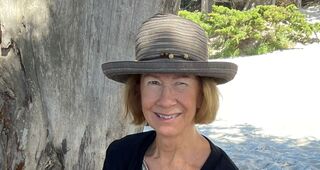Barbara Kensell
Personal Stories
“My husband and I have not been able to be significant Foundation supporters during our lifetimes,” she said, “but I would be honored to leave this gift as part of my legacy.”
Barbara Kensell has been slowly losing her sight for almost 60 years. Diagnosed with retinitis pigmentosa at age 10, she’s learned well how to adapt. And when she lost her husband in April, she lost not only a life partner—she lost someone who helped her navigate the world. But her husband Bob’s passing has given her the opportunity to make an impact the couple was unable to make during their life together—to make a legacy gift to Foundation Fighting Blindness that will support research that could provide treatments and cures for future generations. “My husband and I have not been able to be significant Foundation supporters during our lifetimes,” she said, “but I would be honored to leave this gift as part of my legacy.” When Bob passed away at age 74, Barbara was the beneficiary of his IRA, which she has decided to leave to the Foundation. “I needed to do something with it,” she said. “Because we made that money. I wanted to do something, not while I’m alive because I’m unable to, but in my passing, I want to do something that will make a difference.”

Foundation Legacy Supporter Barbara Kensell
After her initial diagnosis, her mother told her very little about the condition, and even though she took part in an RP study at Stanford at 14, she didn’t realize she would eventually lose her vision until she read a newspaper article about the condition at 18. “My mother would say things like, ‘I want you to get this car when you’re 16 because you may not always be able to drive,’” Barbara recalls. “I guess she kind of spoiled me or gave me different urgency to do things. But we never really talked about it.” As the condition progressed, she lost more and more peripheral vision and never drove at night. She was in her 20s before it really started to make an impact. She’s always been able to adapt, but it got increasingly harder. “There were things that were hard for me because no one knew my situation,” she said. “It was on a need-to-know basis. No one at work knew, and I was able to kind of fake it.” Barbara is from the Bay Area of California—she was born and raised in Cupertino and lived most of her adult life in Walnut Creek. She and Bob met while commuting to San Francisco. “They had bus service going from our community and from the little town where he lived, going into the city every 20 minutes,” she said with a smile. “So, I met him on a bus.” She attended college for a couple of years in Saratoga but never graduated. Bob, who was several years older, had moved to the Bay Area from New Jersey, where he had worked for Bell Labs. She worked as a service manager for Jacuzzi, and he was a manager for Pacific Bell.
As an adult, she took part in Dr. Elliot Berson’s well-known study of vitamin A and RP, which ultimately showed that a regimen of vitamin A, DHA, and lutein preserved vision in people with certain forms of RP. She’s able to read using inversion (white letters on a black background), and she can watch television, but she misses a lot. Losing Bob changed a lot. “He was so good, and we worked together so well,” Barbara said. “It was such a loss when he was gone because going back so many years, he would know things to point out. We would walk, and when we came to a curb, he would hesitate for a second, and then we would step down. We just worked. He knew how awful it was.
The decision to leave Bob’s retirement account to the Foundation wasn’t a hard one. She’s lived with declining vision for years, and she’s taken part in multiple studies.
And she knows the Foundation will put the funds to the best use.
I wanted to earmark it for RP, and I wanted it to go to research,” she said.
“We chose not to have children, so this makes sense. Bob was so impacted by my vision loss that I think he would want nothing more than a cure or something that would slow the progression.” And though she won’t live to see the impact of her gift, she’s positive it will make a significant difference.




